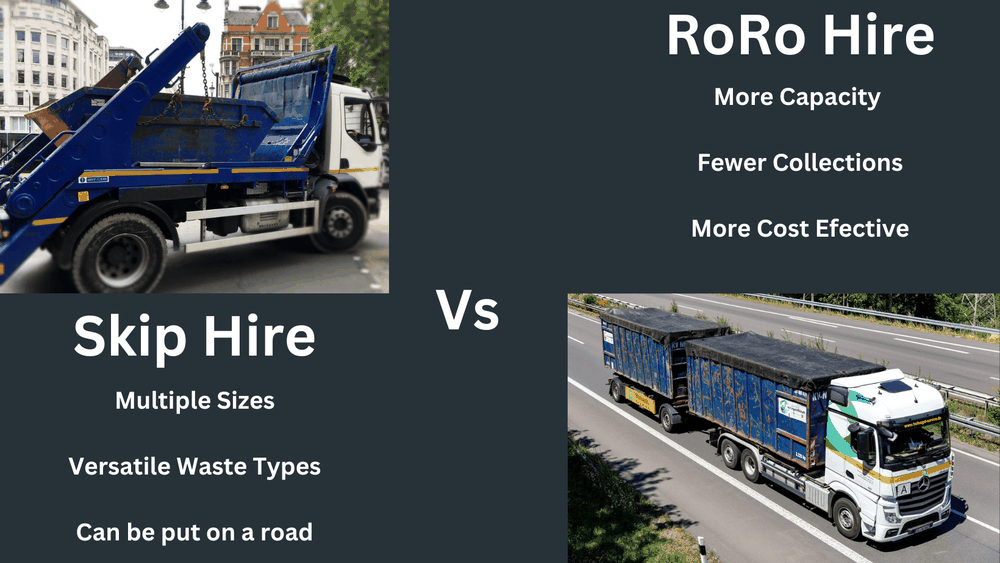Skip Hire vs RoRo

When it comes to disposing of large quantities of waste, skip hire and roll on/roll off hire are two of the popular options. Both methods have their advantages and disadvantages, and choosing between the two can be difficult. In this article, we will explore the differences between skip hire and Roro hire to help you decide what option is the right one for the task at hand.
Skip Hire
Skips come in a variety of sizes 2-yards up to 16-yards and can be used to dispose of a variety of waste types, including mixed waste. When it comes to your waste management needs a skip could be the right tool for the job.
Advantages of Skip Hire
Skips come in a variety of sizes, therefore can be very versatile, used for small garden clear outs but also large scale domestic projects.
A hired skip can be placed on a road. 2-yard up to 8-yard skips can be put on a public road with a skip permit. So if you do not have a driveway, you can still make use of a traditional skip.
Skips do not require a huge amount of space, therefore can be used domestically.
Disadvantages of Skip Hire
Skips have a maximum size of 16-yards. This may not be appropriate for huge amounts of waste and may result in you having to order multiple skips.
Soil and hardcore can only be placed in skips 2-8 yards. Any heavy waste cannot be placed in large skips.
Placing a skip on a road comes with extra costs of the skip permit. There is also the chance the local council turns your permit application down.
Roll On Roll Off Skip Hire
Roll on roll off skips (ROROs) are the biggest waste containers in the waste industry, traditionally used for large quantities of non-hazardous waste. These large waste containers are excellent for high volumes of light and bulky waste. The RORO skip is a large rectangle container that can be rolled on and rolled off a flatbed transport truck.
Advantages of Roll On Roll Off Skips
Great for large volumes of waste: due to the size of the RORO skip you can dispose of huge amounts of waste. Great for heavy and bulky waste on building or demolition sites.
Cost effective: the capacity of the RORO skip means you will not require multiple skips. Therefore cutting down on costs
Versatility of waste: unlike large skips, such as 16-yard, the RORO can be filled with heavy waste like soil and rubble.
Fewer collections are needed, as you have a larger container, compared to a skip which may need a weekly collection.
Disadvantages of Roll On Roll Off Skips
Require a large amount of space: due to their size the RORO skips require a lot more space than a skip.
Skip Placement: ROROs require enough space for the lorry to deliver the skip. This may reduce the options of where the skip can be placed.
Cannot be placed on the road: ROROs cannot be placed on a road like a 4-yard skip can.
You will be charged by the weight of the waste in the RoRo after collection, therefore will not know the upfront cost of the RoRo. This make budgeting more difficult.
Author: Spencer Murphy
10 March 2023
Still have questions?
You can send us message, call or chat live with an expert for personalised advice.